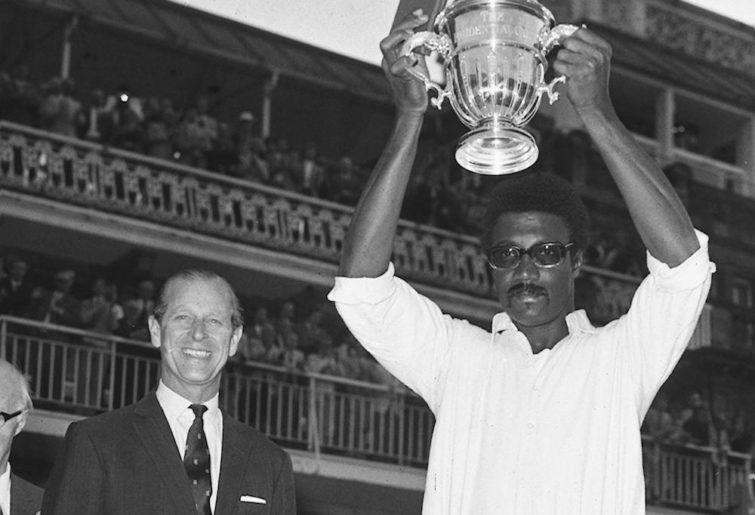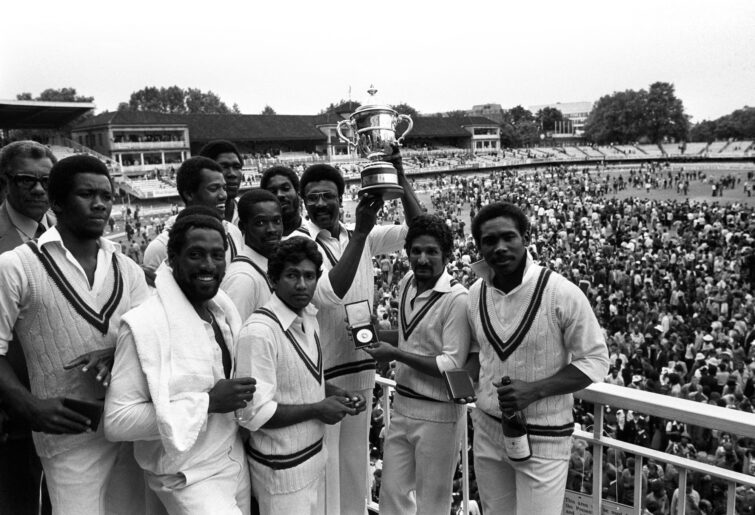So as I’ve clearly banged on about incessantly in this overlong series, I continue to celebrate the mighty Western Australia cricket dynasty.
Most recently with the WA players who have represented Australia proudly in their five (count ’em, five) World Cup wins.
Special thanks must go to Brendon Julian (who didn’t play in a final and was born in NZ) and Luke Ronchi (for NZ) for their proven patriotism.
Given the sheer strength of the WA team, they clearly are the boss domestic team. Well, only clearly if NSW is ruled ineligible for having an awesome team also, so lamentably and logistically that just needs to happen.
So WA claim the title of supreme Domestic Universe Boss. Who wouldn’t want that title? It sounds like a toilet cleaner.
So WA progress to challenge for the ultimate title: The Masters of the ODIverse. So it’s time to cobble together their opposition.
And with all things cricket, whenever I’ve been cobbling together these spurious best-of teams, it splays off into thousands of other teams that could be picked.
A best ever team of international players of fewer than 16 ODIs? Well there’s a million of those, and that team is ridiculous: Jimmy Cook, Colin Cowdrey, Clive Rice, Garfield Sobers, Basil D’Oliveira, Brian Close, Bevan Congdon, Simon Cook, “You know nothing” John Snow, Brett Schultz, Bishen Bedi, Asif Iqbal, Mushtaq Mohammad, Sylvester Clarke, Ezra Moseley, Lee Germon, Devon Conway, Kyle Jameson, Jeff ‘The All Black Winger’ Wilson, Rodney Redmond…
The list goes on.
And the cobbling cobble always leads to one consistent trend: the West Indies are so good. Soooo good. They have soooo many superstar players, these pirates of the Caribbean demand a team of their own.
Don’t believe me? Then you mustn’t believe the 1980s existed, you decade denier.
And more importantly, they have a fully sick team of players who played in fewer than 16s ODIs including a World Cup final. How sick is that? Fully.
There’s only one problem: the Windies didn’t quite have that many players who played fewer than 16 ODIs including a World Cup Final.
But, fortunately, the gracious minnows England have offered to help us out.
How do the minnows do that? Well, the minnows agree that they are rubbish at cricket, and really they don’t deserve to retain ODI status (or Test status for that matter, but that’s another agreement for another article).
Anyway, because matches against the minnows are not official, they don’t count. It’s known as the Minnows Law. Thanks, Minnows.
So we’re off to Kokomo to have the final of the Masters of The ODIverse: West Aussies who played in a World Cup-winning final against the West Indies (with fewer than 16 ODIs) who played in a World Cup final.

(Photo by PA Images via Getty Images)
Gentlemen, may the best west win.
Collis King
He is selected to open for obvious reasons and his 18 ODIs are adjusted to nine thanks to the Minnows Law.
Collis was another banned for life for signing with the Rebel Tour, but you just look at the ’79 World Cup final for some indication of his talent.
Coming in at 4-99, he spanked the minnows for 86 off 66 out of 139 in 77 brutal minutes. It included a four (one of ten) off his first ball from Ian Botham, and three sixes.
He also bowled three overs (0-13).
Roy Fredericks
An opener with a very good Test (59 Tests at 42) and first-class record, ‘Fred’ opened the batting in the ’75 World Cup final and hit seven off 13, before hitting the wicket off Dennis Lillee.
He was the first player in a World Cup to do so. Good to know for any cricket trivia night.
Lawrence Rowe
Yep. Lawrence Rowe. Michael Holding described ‘Yagga’ as the best batsman he ever saw.
He only played 11 ODIs (another rebel tourist) with one 50, but seriously if ‘Whispering Death’ said that, man that’s some serious street cred right there.
Rohan Kanhai
Awww man this dude could bat.
Scoring 15 hundreds in 79 Tests at 48, he formed the legendary three Ks along with Alvin Kallicharran and Keith Boyce.
He scored 55 off 105 in a partnership of 149 with Clive Lloyd and finished up playing seven ODIs at the very end of his fantastic career.
Faoud Bacchus
Rebel tourist Faoud Bacchus was born in India, so the ODIs he played against India don’t count. And any ODIs he played against the minnows don’t count because of the Minnows Law.
So that means Faoud is near enough to 16 ODIs. His one Test century sadly also doesn’t count: 250 against India (and he was dismissed hit wicket. Hit wicket? Seriously? That’s twice in one article. C’mon guys).
Keith Boyce
Boyce was a right-arm quick who played eight ODIs and the ’75 World Cup final where he played a dead-set blinder.
Clive Lloyd was man of the match in the days when the top scorer always got the beautiful Seiko gift watch, but Boyce scored 34 off 37 and then took 4-50.
I can’t recall many, if any, better all-round performances in a World Cup final. It’s like Mike Veletta-Shane Warne.
Bernard Julien
A left-arm seamer and flashy right-arm batsman with the initials BJ. Remind you of anyone? No, not BJ Watling, you pelican.
This BJ only took 18 wickets in 12 ODIs but managed his top score of 26 off 37 in the ’75 World Cup final. He took the new ball with some bloke named Andy Roberts and ended up with the Bruce Reid-like figures of 0-58.
He was banned for life when he signed for the Rebel Tour but during his official Test career he put on a handy 231-run partnership with some bloke named Sobers at Lord’s. Against the minnows, of course.
Deryck Murray (wicketkeeper)
His tally is adjusted to 16 ODIs with the Minnows Law. Obviously when you’re the national keeper for the team for 16 years, you’re the wicketkeeper in this team. Der.
He played in ’75 (he scored 14 off ten, and ran out Jeff Thomson) and ’79 (scoring five off nine, and catching Bob Taylor off Joel Garner for a duck).

The West Indies hoist the 1979 Cricket World Cup trophy. (Photo by PA Images via Getty Images)
He is a shandy behind Jeff Dujon as keeper for the best ever Windies XI.
Vanburn Holder
Another vet of ’75, he’s not related to Jason so stop asking him.
He is an accurate fast-medium, mostly first- or second-change bowler who took 19 wickets in 12 ODIs.
I’m-Not-Related-To-Jason’s effort in the big dance was, well, weird. He scored six off two batting ten, ran out Max Walker and took 0-65. See, that’s weird.
Colin Croft
He was selected in the ’79 final and took 3-42 bowling with Roberts, Holding and Garner (‘Big Bird’ took 5-38).
His 19 ODIs are adjusted to 13 using the Minnows Law, and in those games his bowling average was 20. Yep, 20.
Oh don’t worry: in 27 Tests he took 125 wickets at 23. And most of the time he couldn’t make the starting XI. Like seriously.
Lance Gibbs
Yep, Lance Gibbs was selected in the ’75 squad. He played one match in the tournament, going wicketless against Sri Lanka, but by this stage he was nearly 39 and the Windies were going with their veritable plethora of quicks.
Fair enough, too. But his three career ODIs get him in and he brings brilliant balance to an already brilliant team.
There are two ways of looking at how the battle of the Master of the ODIverse plays out: as a westerner, you look at the Windies team sheet and just cry. That’s one way.
The other way is look at the result of the ’83 final. The ’83 Windies team was arguably the strongest, most experienced Windies team to play in a final and they were rolled by India in a massive upset.
And with ‘Shameless’, ‘The Capital’, ‘Damo’, ‘Gilchurch’, BJ (the Kiwi/Aussie) and of course Ronchi, anything is possible.
We are finally closing in on the conclusion to this painfully drawn-out series.
Up next: The WA under-16 Sheffield Shield team faces their first international opponent. And it’s not who you’d expect.






























































































